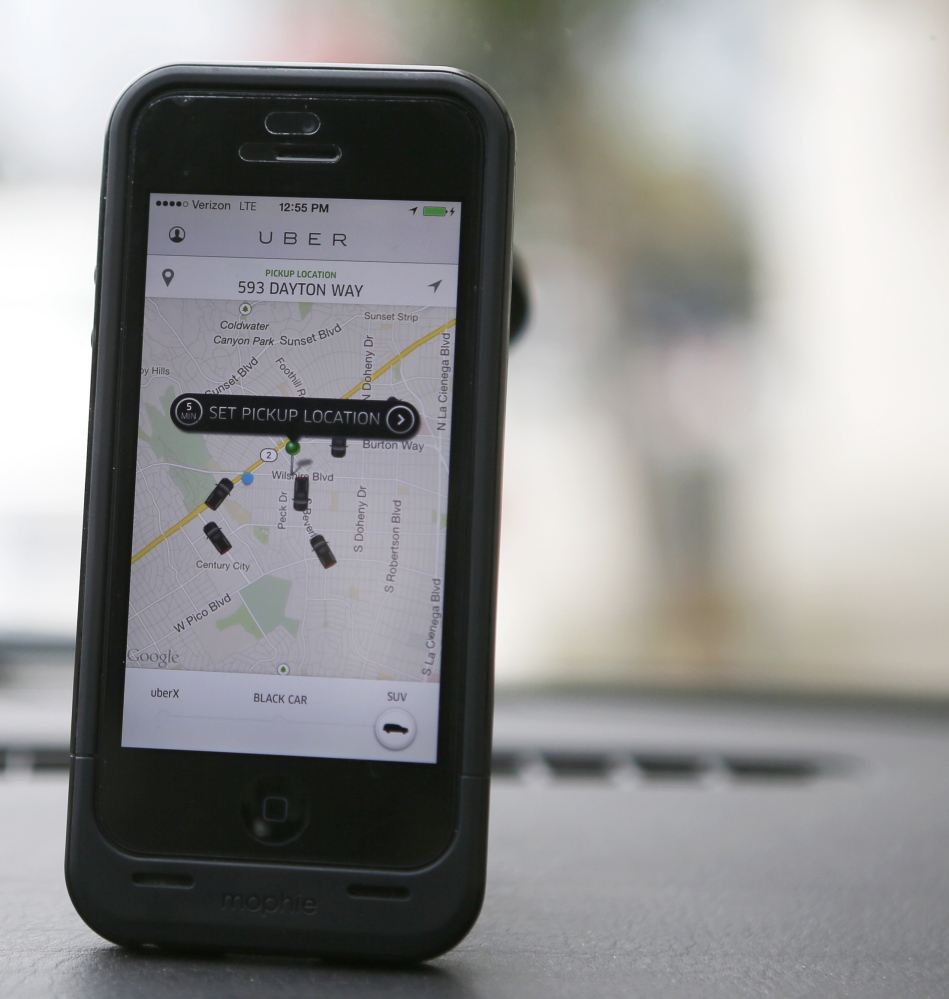Online ride company Uber has landed in Portland.
The company that competes with taxis in more than 200 other cities worldwide began offering its app-based ride service at noon Thursday, the company said in a statement.
Uber’s business model relies on customers texting or downloading its smartphone app to book rides online. UberX, the version that is operating in Portland, is the company’s lower-cost option – drivers use their own cars rather than the company’s fleet of vehicles.
The company says its fares will be lower than those for traditional taxis, and listed some on its website: $10 to get from the Old Port to Deering Center; $6 to get from downtown Portland to the West End; and $12 from the Portland International Jetport to the Arts District.
Portland taxis charge $1.90 for the first 1/10th of a mile and 30 cents for each additional 1/10th.
The service will extend as far north as Freeport, south to Biddeford/Saco, and as far west as Limerick, Raymond and Gray, according to a map on the company’s website.
“We’ve been getting ready for Portland for a number of weeks and months,” said Billy Guernier, general manager of regional expansion for Uber. “We have thousands of riders already signed up.”
Guernier declined to provide the actual number of riders. He said hundreds of drivers have applied online, and the company is now working through their applications. Applicants must be legally licensed to drive in Maine, including carrying auto insurance, to qualify.
Although the service transports people from point to point within a service area, right now Uber operates outside of Portland’s regulations for taxicabs and liveries.
In Portland, a livery is transportation service that customers arrange in advance. Taxis can be hailed from street corners. The city also regulates cab rates, while Uber follows its own pricing model. Portland regulates liveries and taxis, setting standards for cost, cleanliness and qualifications for drivers, including a background check and criminal history report on people who apply to drive.
“Any time we have a new company coming to Portland, we think that’s great,” said Jessica Grondin, spokeswoman for the city of Portland. “But obviously the City Council will have to figure out where they fit into our city code.”
Uber gave scant notice of its arrival, calling the city about 24 hours in advance of its noon opening Thursday, Grondin said. She said the service does not fit into either of the taxi cab or livery regulatory categories, and the City Council will be responsible for taking up any potential changes to city codes that would apply to Uber.
Portland City Councilor Jon Hinck said he would be willing to hash out Uber’s regulatory presence in the city, and could see a few pitfalls already.
“It would appear to be less easy to monitor and a little less regulated,” Hinck said.
He also said public safety concerns could easily play into how the city wants to approach the company. Taxicabs and police traditionally have a close relationship, and when a problem arises between drivers and passengers, officers know who to go to. Uber could be more complicated.
“It would be unfortunate if it harmed established businesses but I want to keep an open mind to services that might operate more efficiently,” Hinck said.
“We’ve been in contact with the city, but I think there’s an education process for wherever we go,” Guernier said. “I have no doubt over time new regulations will be crafted that should codify what we already do.”
For drivers, the payment system is also different. Cabs in Portland are leased for 12-hour shifts, with drivers paying a flat rate for the shift, plus gas. Drivers keep any money earned beyond those expenses.
UberX drivers provide their own cars. The company collects a 20 percent commission on all fares, with less emphasis on set hours and shifts, Guernier said.
Unlike large cities where licenses for taxicabs are coveted, the cost to become a cab driver in Portland is relatively low, Grondin said. Anyone who wants to be a cab driver in Portland must pay about $150 for license and fees, and pass a criminal history check.
Craig Cobbett, who owns 207 Taxi, a company with 16 cabs, said he has been watching for the arrival of Uber closely, and believes they are “testing the market” in Portland. Cobbett said the company is likely to compete with his for the small pool of potential drivers.
“When things are new (customers) are going to give it a shot,” he said. “But they’re going to need coverage. We have trouble finding drivers now. There are only so many people who are willing to do that.”
Although its service is convenient, Cobbett said, Uber could also hit hurdles with insurance regulations – questions that are nagging Uber now that it is expanding around the world.
Guernier said Uber is insured for $1 million per accident, although how that insurance has been applied in other states after catastrophic accidents has been less clear.
The company has also faced criticism in other cities for some aspects of its business model, such as surge pricing – increasing fare prices during bad weather or emergencies; for trying to limit the company’s liability for its drivers’ behavior, contending that it is a technology company and not a transportation company; and by classifying its drivers as contractors, rather than employees.
Staff Writer Matt Byrne can be reached at 791-6303, or at:
Twitter: MattByrnePPH
Send questions/comments to the editors.




Comments are no longer available on this story